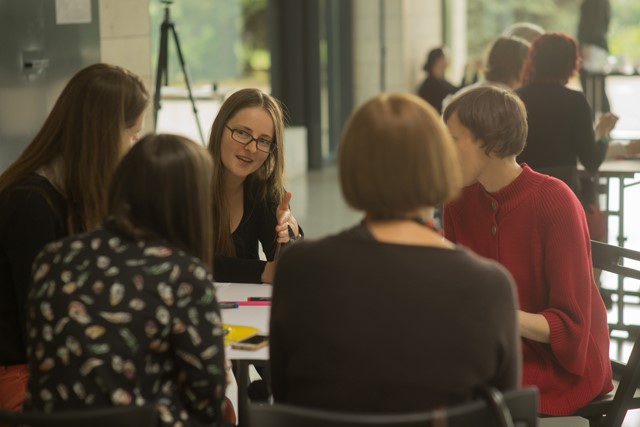“Accessible Art: Museums, Communities & Socially Excluded Groups”
International Event
Wednesday-Thrusday, 14-15 June 2017
National Gallery of Art, Vilnius
The international conference “Accessible Arts: Museums, Communities & Socially Excluded Groups“ is the Erasmus+ programme project “Museums, Art & Alzheimer’s” (MA&A) results dissemination event.
The conference aims to draw the public attention to the fact that the cultural sector is given responsibility to find ways to make art accessible to a diverse public. Museums, artists and cultural organisations can stimulate social change and openness across society, create conditions for people of different ages and interests to explore cultural processes, to gather and participate in an activity of self-realisation. The cultural sector is of great importance in reducing social exclusion and building and strengthening communities.
The international event, “Accessible Arts: Museums, Communities & Socially Excluded Groups“ was focused on questions around how artists and cultural organisations can influence transformative change in society. If museums aspire to become the centre of communities, they should evolve into a learning organisations, with participatory governance at their core, and acknowledge that if they play a role in the lives of their communities, they have the potential to generate their audience’s emotional link with, and sustained interest in culture. New forms of communication can help museums to engage with socially excluded people, suggesting ways in which they could take part in cultural processes, to better acknowledge themselves and others through the arts. Similarly, individual or groups of artists can take a leading role in developing and strengthening communities. Artists, a museum, and cultural organisations, can become researchers investigating cases of social exclusion in societies.
In the context of the event “Accessible Arts: Museums, Communities & Socially Excluded Groups“ the aim of the MA&A – to make art accessible to people with Alzheimer‘s and their carers and families – was put into a much wider context.
The event invited to the discussion around the concept of “access to the arts” and the challenges that are faced when working towards making arts and culture accessible to diverse audiences. The results of a collaboration with partners in Germany, Italy and Ireland in a project “Museum, Art & Alzheimer‘s“ focused attention on the impact museum activity might have on interpersonal communication in the daily life. There were presentations from Lithuanian and other countries’ accessible arts initiatives, which strive to impact on social exclusion of people living with dementia, people with disabilities and health concerns, also – on social integration issues experienced by immigrants. The representatives of Lithuanian, Irish and Scandinavian art museums and galleries shared their experience in access programming.
Guests from Australia and Great Britain has put in the spot-light, the themes of community development through creative art practice and the role of the artist-researcher in the context of social exclusion.
The programme of this event was significantly expanded by Lithuanian artists and cultural organisations (libraries, museums, cultural centres, theatres) presentations, which will share work which aims to reduce social exclusion and promote community development.
Download the programme of the event.
The event was attended by 90 individuals from the field of museums, arts, other cultural organisations, representatives of healthcare and social care sector, individual artists, representatives of municipalities and governmental institutions.

Photo by Eglė Gudonytė
Organiser - NGO “Socialiniai meno projektai”.
Event Partners: the National Gallery of Art, the Lithuanian Museum of Art, the Nordic Council of Ministers Office in Lithuania, the Association of Local Authorities in Lithuania, the Arts for Health at Manchester Metropolitan University, the Lithuanian Museums Association
